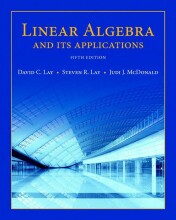Summary: Linear Algebra And Its Applications | 9780134013473 | David C Lay, et al
- This + 400k other summaries
- A unique study and practice tool
- Never study anything twice again
- Get the grades you hope for
- 100% sure, 100% understanding
Read the summary and the most important questions on Linear Algebra and Its Applications | 9780134013473 | David C. Lay; Steven R. Lay; Judi J. McDonald
-
1 Linear Equations in Linear Algebra
-
1.2 Row Reduction and Echelon Forms
-
A rectangular matrix is in echelon form (or row echelon form) if it has thefollowing three properties:
1. All nonzero rows are above any rows of all zeros.
2. Each leading entry of a row is in a column to the right of the leading entry of
the row above it.
3. All entries in a column below a leading entry are zeros. -
If a matrix in echelon form satisfies the following additional conditions, then it is in reduced echelon form (or reduced row echelon form):
4. The leading entry in each nonzero row is 1.
5. Each leading 1 is the only nonzero entry in its column. -
1.7 Linear Independence
This is a preview. There are 5 more flashcards available for chapter 1.7
Show more cards here -
When is an indexed set of vectors {v1, ..., vp} in Rn said to be linearly independent?
When the vector equation: x1*v1 + x2*v2 + ... + xp*vp = 0, has only the trivial solution. -
When is an indexed set of vectors {v1, ..., vp} in Rn said to be linearly dependent?
The set {v1, ..., vp} is linearly dependent if there are weights (c1, ..., cp), which are not all zero, such that: c1*v1 + c2*v2* + ... + cp*vp = 0 -
Theorem 7: Characterization of Linearly Dependent Sets An indexed set S = {v1, ..., vp} of two ore more vectors is linearly dependent if and only if?
At least one of the vectors in S is a linear combination of the others. Furthermore, if S is linearly dependent and v1 is not equal to 0 then some vj (with j > 1) is a linear combination of the preceding vectors: v1, ..., vj-1 -
2 Matrix Algebra
-
2.2 The Inverse of a Matrix
This is a preview. There are 8 more flashcards available for chapter 2.2
Show more cards here -
Theorem 4Let A= when is A not invertible?
When ad-bc = 0 -
How can the determinant of a 2x2 matrix A, be calculated?
det A = ad-bc -
Theorem 6a) If A is an invertible matrix, then A-1 is invertible and?
(A-1)A-1 = A -
Theorem 6c) If A is an invertible matrix, then so is AT, what is the inverse of AT
The transpose of A-1, Giving:
(AT)-1 = (A-1)T -
Theorem 6b generalizationThe product of n x n invertible matrices is?
Invertible, and the inverse is the product of the inverses in the reverse order.
- Higher grades + faster learning
- Never study anything twice
- 100% sure, 100% understanding
































